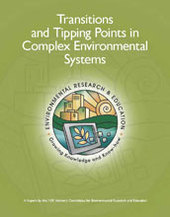Library Item
Transitions and Tipping Points in Complex Environmental Systems
Description:
From Canada to Chile, from Kazakhstan to Kansas, we are witnessing a fast-changing planet. What will it look like in the years, decades and centuries to come?
How far and in what ways can Earth’s systems be stressed before they reach tipping points, undergoing rapid transitions to new states—with unforeseen consequences?
So asks a report released today by the National Science Foundation (NSF)’s Advisory Committee for Environmental Research and Education (AC-ERE).
The report, “Transitions and Tipping Points in Complex Environmental Systems,” finds both challenges and opportunities in the path to finding answers.
“The new AC-ERE report comes at a timely moment,” said James Collins, NSF assistant director for Biological Sciences and coordinator for environmental research and education. "The findings and recommendations are especially important as we see Earth’s environment changing very quickly.
“The report’s focus on environmental complexity and the need to understand how our social systems integrate with the rest of Earth’s systems is an important message,” Collins believes. “Research at the interface of natural and human systems forms the underpinnings for the adaptation and mitigation strategies needed for a changing planet.”
Scientists cannot continue to study the components of environmental systems in isolation from each other, according to Susan Stafford of the Department of Forest Resources at the University of Minnesota and Chair of the AC-ERE. “More research on the links among these systems will enable us to develop an understanding of what may cause ‘tipping points’ in our environment.”
Research alone, however, will not be adequate, said Stafford.
“We need to increase environmental literacy in this country and around the globe. We must also make our research findings more accessible to policymakers, so they will be able to make the decisions that will improve our ability to live sustainably on Earth.”
The world is at a crossroads, according to the report. “The global footprint of humans is such that we are stressing natural and social systems beyond their capacities. We must address these complex environmental challenges, and mitigate global-scale environmental change—or accept likely all-pervasive disruptions.”
The rate of environmental change is outpacing the ability of institutions and governments to respond effectively, according to the advisory committee. “Issues that previously were addressed at the local level are no longer adequately understood without a regional, continental, and increasingly, a global perspective.”
Environmental science, according to the report, must move beyond identifying issues and toward providing sound bases for the development of innovative solutions, as well as effective adaptation and mitigation strategies.
With the challenges of increasing stress on the planet, little time to act, and new research needed, come opportunities, however.
“Developments in cyberinfrastructure are changing how we conduct science and how scientists interact with each other and with the public,” the report maintains. “The tremendous potential of sensors and observational networks to gather consistent data on many variables is critical to responding to the environmental challenges we face.”
Engaging the public is a top priority, the AC-ERE believes. “Without an informed knowledge base, citizens and policymakers are ill-equipped to make responsible decisions about our environmental future. It is time to ask how we can best promote environmental literacy by engaging a cyber-connected society for the benefit of environmental science.”
NSF is uniquely positioned to address these challenges and opportunities, the committee found. "NSF is the only federal agency that supports all fields of science and engineering necessary to understanding complex, coupled natural and human systems.
“If NSF is to be an effective agent of change in environmental research, greater priority must be given to advancing an integrated approach to Earth systems, and to addressing the complexity of coupled natural and human systems from local to regional to global scales.”
Among the report’s recommendations are that:
- It is imperative to increase our understanding of coupled natural and human systems through increased support for broadly interdisciplinary environmental research.
- NSF must evolve from its primarily discipline-centered organization to one that better promotes and supports interdisciplinary approaches, and attracts more scientists and engineers to collaborative and integrative research and education that addresses the nation’s environmental challenges.
- NSF should lead the effort to ensure the implementation of a well-designed and integrated system of observational sensor networks that measure critical environmental variables, as well as changes in key human activities with environmental consequences.
- Efforts should be redoubled to promote new and participatory approaches to environmental education and public engagement through formal and informal venues.
- Helping policymakers develop an in-depth knowledge of complex environmental systems is a priority. Policymakers need an understanding that allows them to appreciate the concept of tipping points, the thresholds of large magnitude or abrupt change, and the socio-economic effects of severely altered environmental systems.
- The complexity of the challenges we face demands a fundamental environmental literacy of all citizens, one that embraces the realities of diverse cultural perspectives, trans-generational time-frames, and local to global connectedness.
- To successfully pursue an environmental agenda, the public must be actively engaged by the scientific research establishment in many different aspects of its work, encouraging a greater role for “citizen scientists.”
The complicated and global scale of connectedness, and rates of environmental change, are beyond anything in human-recorded history. To do nothing in the face of today’s environmental challenges, states the AC-ERE, would be among humanity’s most foolhardy choices.






